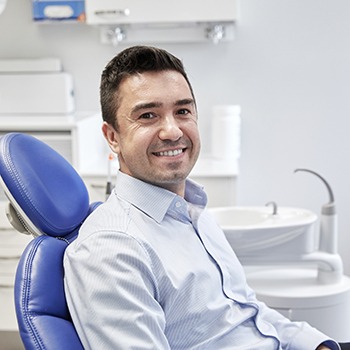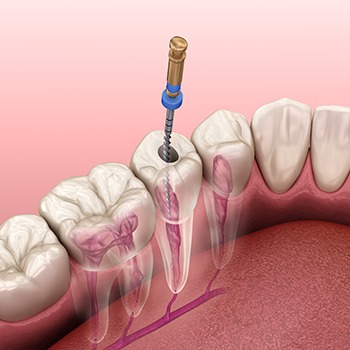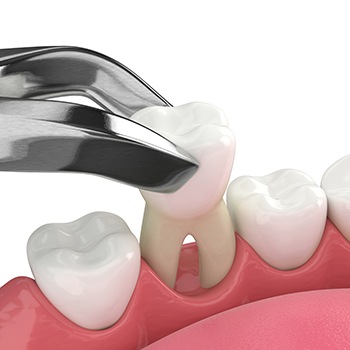Emergency Dentist – Portage, IN
Your Dental Emergency Will Be Seen ASAP

Dental emergencies tend to happen suddenly by nature, leaving patients worried and in pain. Thankfully, it can make a world of difference to know that you already have Advanced Dental Concepts in your corner for same-day emergency assistance! Dr. Hayes is ready to help you find the relief that you deserve. If you’re ever in need of urgent dental care, give us a call!
Why Choose Advanced Dental Concepts for Emergency Dentistry?
- Same-Day Emergency Appointments
- Two Experienced, Caring Dental Experts
- Sedation for Nervous or Anxious Patients
How We Treat Dental Emergencies

When a dental emergency strikes, our team is ready to help you resolve it by following these four steps:
- Scheduling a Same-Day Appointment: We’ll make arrangements to see you as soon as we can – on the same day whenever possible. Our team can help you manage your situation while you wait for your appointment by providing first-aid tips that will be customized based on the symptoms you describe to us over the phone.
- Performing an Emergency Exam: Naturally, we’ll need to learn more about your situation before we can determine the best options for treatment. As such, when you arrive for your emergency appointment, we’ll perform a thorough examination of your mouth.
- Sharing Our Findings: We’ll review the results of our examination with you and explain the situation as clearly as possible. Then, we’ll put together a treatment plan based on your needs. Rest assured that the plan will be made while taking your feedback into consideration, and we’ll make sure that you’re aware of the cost and the likely treatment timeline.
- Carrying Out the Treatment Plan: From dental crowns to root canal treatments, we’ll perform whatever procedures are necessary to stop your pain and help you reclaim a healthy smile.
The Most Common Dental Emergencies
Dental emergencies come in many different forms, but they all require prompt attention if you want to prevent them from leading to even more severe problems. Here are some of the most common emergency cases we treat, so please take a look if you’re unsure whether or not your symptoms fall under this umbrella:
Understanding the Cost of Emergency Dentistry

Since no two dental emergencies are alike, it should come as no surprise that the cost of treating them is not set in stone. That said, you don’t have to worry – we won’t leave you in the dark about the price. In fact, our team can give you a reliable estimate of how much you can expect to pay at your visit. Then, we can discuss the financial solutions available, like CareCredit. If you want to learn more on the topic of price in the meantime, then read on!
Why Every Dental Emergency is Different

As we mentioned above, we can’t provide you with an estimate of the cost without completing a comprehensive oral exam. That way, we have a firm grasp of the cause, the severity of the damage, and how you want to proceed. Then, we can create your custom treatment plan, provide you with the price, and discuss the financial solutions available to fit the cost of your care into your budget.
Does Dental Insurance Cover Dental Emergencies?

Good news: many dental insurance providers do cover a portion of the cost of emergency dentistry. So, if you are insured, don’t hesitate to provide us with your membership information! We are proud to be in-network with Delta Dental and welcome all PPO plans. Plus, we can answer any questions you have, provide you with an estimate of your out-of-pocket expenses, and handle the paperwork for you so the entire process is considerably less stressful.
Other Options for Making Dental Emergencies Affordable

Don’t have dental insurance? Don’t let that stop you from getting the emergency dental care you need! We also have two other financial solutions available, and you can find out a little more about each right here:
- Our Advanced Dental Wellness Plan – When you join, you get immediate access to considerable benefits, like a 15% discount on crowns, bridges, and root canals.
- Flexible Financing with CareCredit – If you’d prefer to break up the cost of your care into smaller, more manageable chunks, you can sign up for CareCredit!
Take Care of Your Smile, Save Money!

A solid oral hygiene regimen won’t just keep your breath fresh and your teeth stain-free; it will help protect your teeth from decay and your gums from infection. So, if you aren’t already, incorporate healthy habits into your routine, like brushing for two full minutes each morning and evening.
Important reminder: many dental problems – from cavities to gum disease – only get worse if left untreated. For this reason, we strongly advise against the “wait and see” approach. Instead, come to our office ASAP so we can restore your healthy smile with the most conservative treatment possible.
Keys to Preventing Dental Emergencies

The best way to minimize the chances of a dental emergency occurring is to take proper care of your smile. Remember to brush your teeth at least two times a day, and turn flossing into a daily habit. Be sure to break any bad habits that can damage teeth, like chewing on ice or using your mouth to tear open packages. If you play any kind of sport, wear a mouthguard in order to keep your teeth safe.
Root Canal Treatment

Root canals may have a “scary” reputation, but this type of treatment is actually ideal if you are suffering from a severe toothache. Excessive oral pain is often caused by advanced infection within the tooth’s inner pulp. Our dentists will carefully access this area and remove the pulp along with the infectious bacteria, thoroughly cleaning the tooth’s natural structure and filling it with a biocompatible substitute. After sealing the area shut to prevent further inflammation, the placement of a brand-new dental crown or filling is the finishing touch.
With the help of today’s advanced tools and techniques, root canal treatment is no more uncomfortable than the placement of a typical filling. Better yet, its success rate is over 90%, and most patients can maintain their treated teeth for the rest of their lives with the help of regular maintenance.
Tooth Extractions

While our team will do everything we possibly can to protect and preserve natural teeth, their loss can sometimes be an unfortunate necessity. When this situation is at hand, we will perform extraction safely and comfortably here in Portage, IN. Some of the most common reasons for extraction include:
- When one or more teeth must be removed to make way for orthodontic treatment or the placement of a new denture.
- When advanced tooth decay or a traumatic injury has damaged too much of the natural structure to support restorative treatment.
- When the third molars (“wisdom teeth”) are impacted, overcrowded, or otherwise threatening the patient’s wellbeing.
Preventive Dentistry Restorative Dentistry Dental Implants Periodontal Therapy Cosmetic Dentistry TMJ/TMD Therapy Sedation Dentistry Invisalign Clear Braces View Our Services

